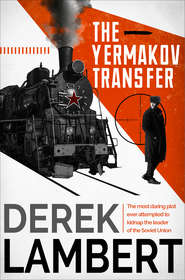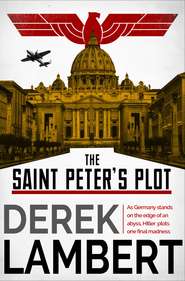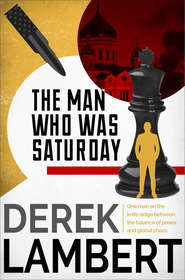По всем вопросам обращайтесь на: info@litportal.ru
(©) 2003-2024.
✖
The Judas Code
Автор
Год написания книги
2018
Настройки чтения
Размер шрифта
Высота строк
Поля
‘Touché.’
Gogol stopped for a moment, holding his back as though it pained him. He thumped the base of his spine with his fist. ‘I can’t walk very far these days. Would you believe that I was once an athlete? Hundred metres sprint champion at the military academy in Kiev?’
‘Why are we going to a decayed dacha?’ Viktor asked.
‘To witness a massacre, of course. I forgot to tell you why Catherine abandoned the place. It was because it reminded her of a coffin.’
*
From behind his cover Viktor could just see the dacha over the top of the ivy-covered wall surrounding it. And it did resemble a coffin. A long, low building surmounted with spires that looked like funeral candles.
He was crouching behind a clump of dusty-leaved laurel bushes. Facing him, across a stony path, a massive wooden door, studded with iron spikes, opened into the wall; set into it was a smaller door; both were guarded by a grey-uniformed sentry who every ten minutes marched along the length of the wall, first to the right and then, re-passing the door, to the left. According to Gogol, who had brought Viktor through the undergrowth to the rear entrance, the smaller door was unlocked and only needed a push to open it. Clearly the sentry, a shabby-looking fellow with pock-marked features, didn’t expect intruders because he marched dispiritedly, staring at the ground; and no official visitors either because he had taken off his cap and was smoking a cigarette. Locals, said Gogol, had been warned not to come anywhere near the mansion and only a select few (GRU, for instance) knew that it was used for executions.
‘Make your move when he’s halfway to the right-hand extremity of the wall,’ Gogol had instructed Viktor, before making his way to the front entrance of the mansion where, apparently, he was expected. ‘Then make your way through the shrubbery to the theatre. At the back you’ll find a potting shed, wait for me there. If you get caught then I’ve never heard of you. I admit,’ he added, ‘that I do still have some faint instincts for self-survival.’
The sentry took a deep drag on his yellow cigarette, pinched out the tip and slipped the remainder into the pocket of his jacket. Then, carrying his rifle as though it were a cannon, he started out to the right of the door.
Viktor tensed himself. Twigs cracked beneath his feet. Dust from the laurel leaves made him want to sneeze.
Halfway across the path he slipped, righted himself and made it to the door. The sentry, a hundred yards away, didn’t look around. Viktor reached out one hand and pushed the smaller door. But it didn’t move. Perhaps Gogol had locked it from inside. Perhaps he wants me dead with a bullet from the sentry’s rifle in my back – or an NKVD bullet in the back of my head in Lubyanka.
The sentry was turning. Viktor pushed again. The door swung open with a creak. He was inside, closing the door, peering round, sprinting for a privet hedge enclosing a shrubbery. He crouched behind a rhododendron. In front of him a spider on a web suspended between dead blooms was devouring a fly; through the web he saw a man wearing a brown smock pushing a handcart. A gardener – reassuring; gardening and bloodshed were contradictions. Then it occurred to him that the garden was so overgrown that gardeners were superfluous; he thought of gardeners exterminating insects and wondered if this one had turned his hand to humans.
He was through the shrubbery and halfway across a stretch of knee-high grass strung with brambles when a shot rang out, freezing him. The explosion stayed with him for a moment like a splash of ink; then it was erased and he was away again.
Was that what he had been brought to hear? he wondered, kneeling behind a lichen-covered wall surrounding a stagnant pool. A single shot and then, perhaps, a glimpse of a body, or what looked like a body, being removed under a blanket? He almost smiled.
Through a crack in the wall he could see the pool; a stone cherub with a ruined face smiled crookedly at him; a fish with a white, diseased body surfaced briefly before returning to the moss-green depths with a flick of its tail. Viktor crawled to the end of the wall; keeping low, he ran to a thicket of holly bushes. Above him loomed the walls of the dacha, the coffin.
On one side lay the half-finished theatre where Catherine the Great had once planned to watch the cream of Russian thespians. It looked a dull place from the outside, dead-eyed and brooding, but then theatres often did. Beside it stood the potting shed, ferns growing from its windows.
Inside the shed Viktor waited. Outside, the shadows were lengthening. The swallows and bats had vanished but somewhere in the tangled undergrowth a bird sang.
Gogol said: ‘Follow me,’ his voice reaching Viktor through the ferns. Viktor joined him outside.
‘Right,’ Gogol whispered. ‘Through that gap,’ pointing at a gap in the wall of the theatre intended for a door. Gogol got there first; inside the doorway he paused, grinding his fist into the base of his spine. ‘Now you’ve got to be careful,’ he said. ‘Just round the corner you’ll see a passage, just like the corridors behind the auditorium at the Bolshoi. Take the first door on the right. You’ll find yourself in a box. If you stand in the shadows at the back you can’t be seen from below. But you’ll have one of the best seats for the show.’ He grinned fiercely. ‘Wait there afterwards for me,’ and was gone.
If there had once been a stage it was no longer there; nor were there any seats; just a rubble-strewn arena cleared at one end in front of a wall that would have been the back of the stage. Half a dozen civilians strolled restlessly about, smoking; leaning against another wall opposite Viktor’s box stood a collection of old M 1891 rifles and two green boxes of ammunition.
So it was going to happen. His belly lurched and with it everything he believed in. No, it wasn’t going to happen; this was bizarre play-acting, a charade. Why the ammunition, Viktor? And what are those stains, so black and regular on the floor?
He returned to his schoolroom where, as a treat, they had screened flickering newsreels of the Revolution. There was Lenin, fierce and yet avuncular, accepting the adulation of his triumphant rebels. He opened a history book and the first page was a red flag that reminded him of a field of poppies rippled by a breeze. There was the new order, there was justice.
The men below selected rifles. More civilians, all in shirtsleeves, entered the arena and picked up the rest of the guns. Crisply, they loaded them. Outside, he heard a vehicle, a lorry by the sound of it, draw up.
Viktor bit deep into the flesh inside his lower lip and tasted blood.
From behind the wall he heard shouts. Hands clenched, body taut, he waited the entrance from the wings. Shouldn’t there have been an orchestra? A conductor in white tie and tails?
In came the players. Middle-aged mostly. All men. All wearing military trousers, all in shirt-sleeves. They walked erect but there was a strange docility about them. They were obviously officers. Did those trained to command accept commands just as readily?
Desperately Viktor wanted to leave his vantage point. To return to the sanctuary of his adolescence, to the toy soldiers of his nursery.
The officers were blindfolded and lined up against the wall, hands behind their heads, elbows touching. Thirty of them, Stalin’s daily ration. I don’t believe it. His skull filled with ice, his legs bent and he had to steady himself with one hand against the wall of the box.
The firing squad lined up opposite the blindfolded men raised their rifles. Some of the condemned crossed themselves.
Now surely they would be granted their last wishes. That always happened. In books, in films …
They slumped. Blood appeared at their breasts. And it seemed to Viktor that he heard the explosions from the rifles after the impact of the bullets.
The abruptness of the transition from life to death astonished him; he could barely comprehend it. A second volley of shots made the bodies jump as they slid to the ground.
Two of the executioners propped their rifles against the wall, drew pistols and walked along the line of bodies shooting out any vestiges of life.
Then the gardener made his entrance pushing his handcart. But Viktor, unconscious on the floor of the box, didn’t see them load the bodies into it.
*
He waited the following evening at the Café Tchaikovsky for three hours. From seven in the evening, the hour at which they usually met, until ten.
But she didn’t come and some inexplicable perversity – nothing had rational explanations any more – stopped him from calling at her lodgings. Perhaps the whole episode had been an act of cruelty on her part for which she had found some anarchic justification; perhaps, like Gogol, she had merely wanted to knock him off his smug perch. Perhaps even now she was naked in the arms of Nikolai Vasilyev. Or Gogol.
She hadn’t attended her class that day but she had sent a note explaining that she had to visit a sick relative at Kuntsevo. Well, she had a grandmother in Kuntsevo (Stalin also had a house there), but that was only seven miles away so she could have been back by seven, eight at the latest, especially when she knew what he had been through.
Later, he decided that he had done so little about finding her because he was still in a state of shock. He believed nothing any more, least of all the earnest babble of the students in the Tchaikovsky.
When she didn’t appear in class the following day he telephoned Nikolai Vasilyev and then, when he didn’t get any reply, went round to Anna’s lodgings in the lunchtime break. Her landlady, an old crone with features as sharp as a claw, told him that Anna had packed her belongings two nights before – the night of the massacre – paid a week’s rent and disappeared.
Viktor didn’t believe her. He threatened her, offered money, but fear and the bribe she had received (the new Viktor Golovin knew she had been bribed) had efficiently silenced her.
He called at Nikolai Vasilyev’s house in the north of the city. But he, too, had disappeared; the woman who answered the door was in her thirties, blonde, pretty and distraught, possibly Vasilyev’s mistress. She didn’t know what had happened; he had been missing for two days. But she had an address for Gogol.
Gogol lived in an apartment near the Alexander Brest Railway Station. Viktor rang the bell but its chime had a lost quality to it. Neighbours told him that they had seen Gogol leave with four men in civilian clothes. Leave? Well, escorted would be a better description, said one old man. ‘But don’t say I said so,’ he added, pocketing Viktor’s rouble.
When Viktor continued to pursue his inquiries his father took him aside and said: ‘Best leave it alone, Viktor. What’s done is done. You can’t bring them back …’
Them? Again Viktor wondered about his father’s source of information.
But what astonished him most as, with suicidal intent, he asked his questions, was the lack of reprisals. What he was suggesting to those he cross-examined was tantamount to treason. And yet he remained untouched. Privileged.
When he had finally ascertained beyond all reasonable doubt that Anna, Vasilyev and Gogol had been purged, Viktor took the only step left to him.
He, too, disappeared.
CHAPTER TWO (#ulink_236e301b-c14f-59a2-8027-2e464abd9d19)
It is difficult enough to determine when a conspiracy is born. Is it at a moment of decision, of inspiration, or is it when two schemers meet on the same train of thought?











